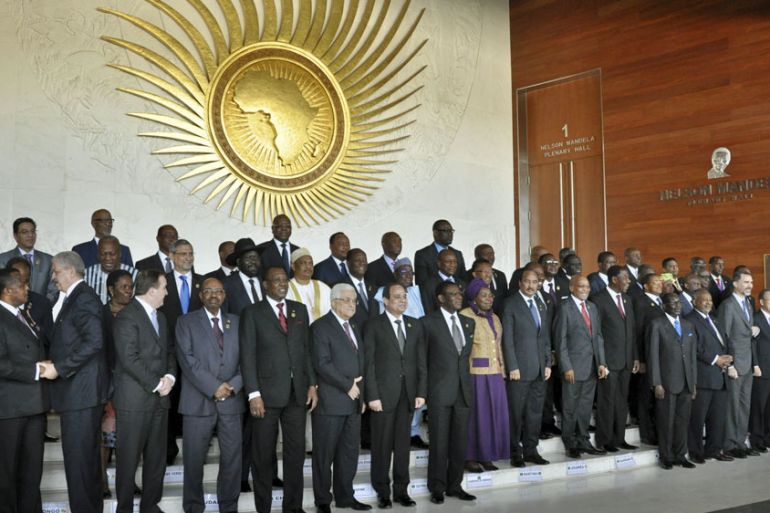The African Union we want
Fifty-four-nation bloc requires resources, leadership and pragmatism to meet challenges it faces.

This year’s African Union heads of state summit was heavy on matters of security.
Africa is at a dangerous place right now. The number of countries in conflict are uncomfortably too many. Armed groups are roaming around almost unrestrained in large swathes of territory in the continent.
Keep reading
list of 4 items‘We share with rats’: Neglect, empty promises for S African hostel-dwellers
Thirty years waiting for a house: South Africa’s ‘backyard’ dwellers
Photos: Malnutrition threatens future Afghan generations
From Boko Haram graining ground in Northern Nigeria and threatening the peace of neighbouring countries to al-Qaeda-linked groups in the Sahel and the horn. The resurging conflicts in Libya, Mali, Egypt and others and the old conflict in the Democratic of Congo, the Central African Republic and South Sudan. There’s Ebola and its unprecedented spread in some of the poorest countries in the continent.
And to top it all, a dozen or so countries hold elections this year.
A lot for the African Union to deal with, but can it?
‘Fair criticism’
The organisation has many critics who have often faulted it for responding late to crisis and then not effectively and actively taking the lead as Africa’s face.
They have also criticised summits which pass resolutions that take too long to implement or never get implemented. A talking shop – many have called the AU.
Solomon Dersso of the Institute of Security Studies said that some of the criticism is fair.
“But you must understand,” he said, “the African Union can take action only to the extent that there is political consensus among member states at the regional and continental level”.
AU depends almost entirely on foreign funding and the goodwill of member states. But there are too many vested interests and states are often either unwilling or unable to commit resources. This makes it very difficult for the AU to do its job effectively.
So one of the declarations made at the end of the just concluded heads of state summit was for the organisation to find alternative sources of funding.
To that end, an AU foundation has been set up to fundraise from the private sector.
Great news, on paper, but it will still take a long time for the union to stop being dependent on the West and increasingly now – the East.
What would Africa want?
In an ideal world though – if it had its own resources, what kind of an AU would we, Africans, want?
Our producer Evelyn Kahungu said “I want more action and less talk, less conference diplomacy.” Simon Munene, our cameraman, feels that there’s not enough representation of Africa’s young people.
He has a point: the AU’s new chairperson is Robert Mugabe. At ninety years old, he is the oldest president in Africa. The rest of the leadership is not exactly what you can describe as young.
Our fixer Dereje Bheranu said “AU needs to push for more intra-Africa trade, we trade more with countries outside of Africa.”
Issues of visa restrictions in Africa have also been raised consistently.
In all fairness, given the right support and political goodwill, perhaps the AU can surprise us.
In fact, it has an action plan “vision 2063” where it sees a fully industrialised Africa with vibrant economies, an infrastructure that connects the entire continent and a flourishing agricultural sector that can sustain all Africans.
Brilliant – but again these require resources, commitment and good. Of course there is a lot of appetite for development. Several African countries are already aligning to vision 2063.
But still, corruption is deeply entrenched in many countries. Our political elite is made up of many power hungry leaders and ordinary Africans continue to pay the price.
When Africa’s heads of state posed for a group photo at the start of the summit, a friend of mine captioned the photo: “Africa’s problems meet to discuss Africa’s Problems”.
Some will argue against that caption, but fact is – the time for AU to actively take up its role as Africa’s representative is now and it’s up to the leaders who were in that photo to make it happen.
It all comes down to political will, resources and a pragmatic leadership.